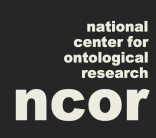The National Center for Ontological Research (NCOR) was established in Buffalo in 2005 with the goal of advancing the quality of ontological research and development and of establishing tools and measures for ontology evaluation and quality assurance. NCOR draws on the expertise of ontologists associated with the University at Buffalo and of their collaborators in scientific, commercial and government institutions throughout the world.
NCOR serves as a vehicle to coordinate, enhance, publicize, and seek funding for ontological research activities. It provides coordination, infrastructure, and independent review to organizations employing ontologies in fields such as defense and intelligence, management, healthcare and biomedical sciences.
It provides researchers working in ontology-related areas with specialized support in seeking external funding and in assembling collaborative, interdisciplinary teams both nationally and internationally. It provides consultant services for ontology projects especially in the defense and security fields and in health care and biomedical informatics. NCOR also engages in training and outreach endeavors that are designed to broaden the range of institutions and individuals accepting the goals of high quality ontology in both theory and practice.
What is Ontology?
Contemporary ontology is a partnership of multiple disciplines. On the one hand ontological research involves philosophers who are concerned to describe broad categories of entities and their most basic relationships. On the other hand ontologists are working in diverse fields of computer and information science to provide more narrowly focused classification systems in areas such as bioinformatics, engineering, or defense and security.
Ontologists have identified a wide range of theories and methods to aid the consistent representation of data and information using classifications of this sort, called ‘ontologies’. The idea, in all these cases, is that when bodies of data are annotated using well-structured ontologies, these data can be more easily retrieved, integrated and compared, and they can more easily be exploited for purposes of computer-based reasoning.
In biology and biomedicine, especially, ontologists have developed controlled vocabularies such as the Gene Ontology that are being used to describe the results of biological experiments in a consistent fashion that allows comparison of data pertaining to multiple species, diseases and biological systems. In government, administration and commerce ontologies are being used, similarly, to connect data across different departments (such as large government agencies) and to make these data accessible to standard software tools.
Ontologists study how definitions, classifications and relationships should be formulated using the tools of logic and formal semantics in order to most effectively achieve these goals. Their research provides foundations for diverse technologies in areas such as information integration, natural language processing, data annotation, and the construction of intelligent computer systems. Ontologies can also be used by human beings to codify and make explicit common understandings that support human-to-human communication and successful collaborative research across disciplinary boundaries.
